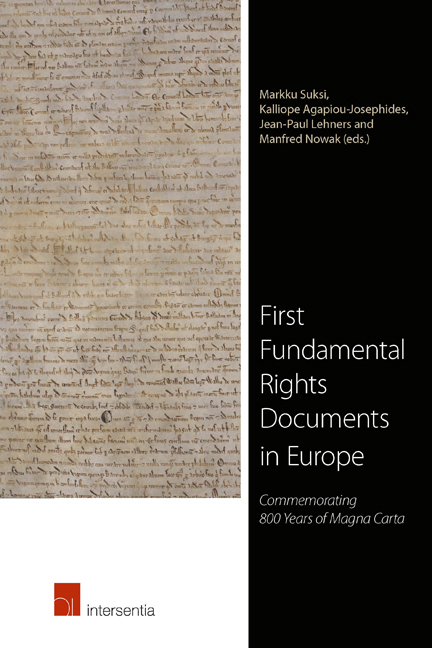Book contents
- Frontmatter
- Preface
- Contents
- List of Authors
- 1 Introduction
- PART I
- 2 The United Kingdom: From Magna Carta 1215 to the Rule of Law
- 3 Ireland: Individual and Group Rights in Ancient Irish Law
- 4 Italy: The Liber Paradisus — A Vision of Good Governance
- 5 Hungary: The Historic Constitution as the Place of Memory
- 6 Belgium: From Collective Privileges to Individual Rights
- 7 Austria: Manorial Regulation of Mining and Use of Forests as Potential Antecedents in Fundamental Rights
- 8 Spain: The First Cry for Justice in the Americas — From Antonio de Montesinos to the Laws of Burgos (1512)
- 9 Lithuania: From Equality to Inequality and to Equality Again
- 10 Poland: From the Golden Liberty of the Nobles to Fundamental Rights
- PART II
- Index
9 - Lithuania: From Equality to Inequality and to Equality Again
from PART I
Published online by Cambridge University Press: 15 December 2017
- Frontmatter
- Preface
- Contents
- List of Authors
- 1 Introduction
- PART I
- 2 The United Kingdom: From Magna Carta 1215 to the Rule of Law
- 3 Ireland: Individual and Group Rights in Ancient Irish Law
- 4 Italy: The Liber Paradisus — A Vision of Good Governance
- 5 Hungary: The Historic Constitution as the Place of Memory
- 6 Belgium: From Collective Privileges to Individual Rights
- 7 Austria: Manorial Regulation of Mining and Use of Forests as Potential Antecedents in Fundamental Rights
- 8 Spain: The First Cry for Justice in the Americas — From Antonio de Montesinos to the Laws of Burgos (1512)
- 9 Lithuania: From Equality to Inequality and to Equality Again
- 10 Poland: From the Golden Liberty of the Nobles to Fundamental Rights
- PART II
- Index
Summary
INTRODUCTION
The Constitution of the Republic of Lithuania of 1992, which is currently in force, explicitly mentions in the preamble its link with the sixteenth century Statutes of Lithuania and the Constitutions of the Republic of Lithuania from the period between World War I and World War II. Lithuanian legal scholars also note the importance of the 1791 Constitution of the Polish-Lithuanian State for the history of the constitutional law of Lithuania. Presently researchers into the history of Lithuanian constitutional law hold that the earliest written sources of Lithuanian constitutional law are ducal privileges from the end of the fourteenth century. Among these privileges, the privilege issued in Vilnius by the Grand Duke Jogaila to Catholic nobility on 20 February 1387 stands out as the earliest constitutional document on fundamental rights.
The privilege of 1387 is important in that it marked Lithuania's transition from the ancient law based on equality, to the Medieval law based on inequality of estates. The resulting hierarchy of society, which resulted in the nobility becoming the segment of society whose rights and liberties were widely protected, was fully developed in the sixteenth century as reflected in the three versions of the Statutes of Lithuania. The next change of revolutionary importance for the law of Lithuania in general and the protection of fundamental rights in particular took place only in 1918 when Lithuanian law entered the modernity marked by respect for the principle of equality. This chapter examines the privilege of 1387, the Statutes of Lithuania, and the Interim Constitution of 1918 in turn.
THE 1387 LAND PRIVILEGE TO THE NOBLES
HISTORICAL CONTEXT AND GENERAL OVERVIEW
Lithuanians in 1387 and Western Lithuanians, or Samogitians, in 1417 were the last in Europe to accept the Roman Catholic faith. A pagan Lithuanian state which was formed in the middle of the thirteenth century suffered from aggression by the Teutonic Order which sought to gain control of the country and then convert the population without granting the new Christians any political or social rights. A potential acceptance of baptism from the Teutonic Order by Jogaila, the Grand Duke of Lithuania, could mean the loss of Samogitia to the Order.
- Type
- Chapter
- Information
- First Fundamental Rights Documents in EuropeCommemorating 800 Years of Magna Carta, pp. 107 - 122Publisher: IntersentiaPrint publication year: 2015



